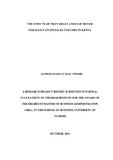| dc.description.abstract | The insurance industry in Kenya is highly regulated by the government. This is because of the nature of business transacted and the fact that being a service industry, what is sold is a promise for future compensation in case of a loss occurring. This banks on the uncertainities of risk as well as the extent of financial losses experienced by the victim should an insured peril operate. This Supervision and regulation is carried out by the Insurance Regulatory Authority on behalf of the government. The Insurance Regulatory Authority is mandated to ensure that the public has confidence in the various insurance companies as well as that the industry operates in a profitable manner in order to avoid collapse of any company due to heavy losses. The industry has been making huge losses in the motor insurance and in an endeavor to manage the losses and save the companies from imminent collapse, the regulator issued pricing guidelines on this class and set out serious penalties for those who failed to implement the guidelines. The effect of this directive was felt across the industry, and this study was carried out to establish the actual effects on the sales volumes as well as the shift in market positioning strategies adopted by the various stakeholders.The study adopted a descriptive research design. The study population was all the 35 insurance companies that deal in motor insurance and were therefore affected by this directive. Data was collected through questionnaires that were emailed to the various respondents and followed through phone calls. The data collected was then analysed using statistical descriptive tools and results presented on tables in forms of frequencies, mean, standard deviation and percentages. From the research findings, the companies demonstrated having various combinations of marketing positioning strategies applied at different extents. The sales volumes had dropped significantly across the market and there was great discomfort among the customers who had to pay more to insure their motor vehicles. It was also found that there was an overwhelming support of this directive by the insurers and most of them confirmed having implemented the same. However, there was suspicion amongst peers and a general feel that the regulator was unable to enforce the directive. Further, many executives expressed their feeling that the directive may not hold into the future. The study recommended that all industry stakeholders should work together to ensure a stable and economically viable industry that is able to meet its financial obligations, andthat the Insurance Regulatory Authority should find a mechanism to enforce its directives. | en_US |

